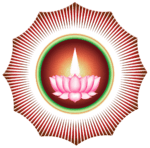Etymology of Ayyavazhi
| Part of the series on |
| Ayyavazhi |
|---|
 |
|
Related systems |
|
This etymological topic deals with the origin, regeneration and evolution of various names by which Ayyavazhi is referred or identified throughout the period of Ayyavazhi history. Though the name 'Ayyavazhi' is commonly used and the most accepted term to represent Ayyavazhi there are other terms too which are used to refer it.
Ayyavazhi
The exact origin of the name Ayyavazhi is not known. The various theories on its derivation include:
- Ayya's path
- from the direct synonymous derivation, which takes Ayya as a noun (naming word) of Ayya Vaikundar.[1]
- Path of Father
- from the local spoken-Tamil language Ayya (father) and vazhi (path). This meaning, derived from Tamil, is most commonly used as 'ayya', and means 'dear father'.[2]
- The ultimate truth of Master
- [3] from Tamil Ayya (Master) and vazhi (the ultimate truth) is derived from the literary usage of the words.
- Religious system of Guru
- from Tamil Ayya as (Guru) and vazhi (religious system - vazhibadu in Tamil).
- Way of attaining the sacred feet of God
- Ayya as (God) and vazhi (way to unify)[4]
The synonymous versions of the phrase are virtually unlimited, because the usage of the word 'Ayya' in Tamil varies widely. It is used to convey the words father, guru, the superior, a person of dignity, respectable one, master, the king, the teacher, preceptor, etc. The word 'vazhi' in Tamil can mean the way, a course of conduct, manner, method, mode, cause, antiquity, succession, religious system, reason, and so on.
As Muttukuttyism
This was a name given to Ayyavazhi during the late 19th century by the London Missionary Society Missionaries who is of negative views over Vaikundar. So they pour hatred on both Vaikundar and the belief centering him. They, however, recognise Ayyavazhi as an alternate religious phenomenon against or outside Hinduism. They referred to Ayyavazhi as Muttukutyism, being mistaken that Muttukutty is the one who believed as a god-incarnate by the followers.
The following is a quote from the Annual report of Nagercoil Mission district, Kottaram Division (Eastern division), of LMS for the year 1872.
It was in the village comprising this (Thamaraikulam) section that the gospel gained its earliest conquests in South Taravancore. Progress was rapid. Congregation were formed and adherents come over in great numbers. In 1821 there were upwards of 1200 converts in these place. It seemed as if the whole population would soon be brought under the influence of the cross. But a terrible check was given to our operations by the rise of Muthukuttyism. ... shrines rose, rites and ceremonies are initiated, temples were dedicated and lastly a car festival was instituted at Kottayady to which thousands are annually drawn from the towns and villages far and near. This cunning contrivance of Satan has much impeded our progress in these parts and s still a great power of darkness against which we have to wage unceasing war. Our weapon are mighty through god, to the pulling down of strongholds. We have truth on our side against which neither Muthukuttyism nor any other gate to hell shall prevail. All we need is more life in these churches...
Other terms

- Anbukkodi Makkal
- [5][6][7][8] The people of Love flag.
- Ayya vazhibadu
- [9] The system of worshiping Ayya.
- Samy Vazhi
- The path of Swami (Ayya).
- Anbuvazhi
- [10][11] The Path of Love.
- Anbukkodi Iyakkam
- [12] The system of Love flag.
- Ayyavazhi Iyakkam
- [13] The Ayyavazhi movement.
- Vaikunda Swamikal Iyakkam
- [14] Vaikunda Swami Movement.
- Vaikundar Neri
- [15] The Vaikundar virtue (propriety, morality, rectitude, truth, system, rule, ...).
- Sri Narayanaswami Sect
- [16]
- Vaikunda Swamikal Sect
- [17]
See also
Citations
- ↑ R.Shanmugam's, Narayana Kulatthil Narayanar Avataram, Page:188
- ↑ R. Ponnu's, Sri Vaikunda Swamigal and the Struggle for Social Equality in South India, Ram Publishers, 2000, Page 68, Sub heading: "Reverence as Ayya"
- ↑ Akilathirattu ammanai Arappadanool, First Stage, page 27, published by Vaikundar Seva Sangam
- ↑ Arisundara Mani's,(2002), Akilathirattu Ammanai Parayana Urai Chapter 1, Page 4.
- ↑ Pulavar.R. Shunmugam, (2000), Nadar Kulathil Narayanar Avataram, Nadar Kuladeepam Publications, page 189
- ↑ Tha. Krushnanathan, (2000), Ayya Vaikundarin Vazhvum Sinthanaiyum, Thinai Publications, page 61
- ↑ R. Ponnu, (2002), Ayya Vaikunda Swamikal Ore Avaratham, Ram Publications, page 129
- ↑ The Daily Thanthi (Nagercoil Edition), 2007-01-29, Page 12.
- ↑ R. Ponnu, (2002), Ayya Vaikunda Swamikal Ore Avaratham, Ram Publications, page 153
- ↑ R. Ponnu, (2002), Ayya Vaikunda Swamikal Ore Avaratham, Ram Publications, page 100
- ↑ "www.dinamalar.com". Dinamalar (Leading Tamil Daily), March 03, 2008. Archived from the original (Silently spreading Love-flag) on March 14, 2008. Retrieved 2008-05-03.
- ↑ R.Shanmugam's, Narayana Kulatthil Narayanar Avataram, Page:189
- ↑ Tha. Krushnanathan, (2000), Ayya Vaikundarin Vazhvum Sinthanaiyum, Thinai Publications, page 83
- ↑ R. Ponnu, (2002), Ayya Vaikunda Swamikal Ore Avaratham, Ram Publications, page 163
- ↑ Pon. T. Dharmarasan, (1996), Akilathirattu, Pon Publications, page 163
- ↑ R. Ponnu, (2002), Ayya Vaikunda Swamikal Ore Avaratham, Ram Publications, page 188 (Reference section)
- ↑ R. Ponnu's, (2000),Sri Vaikunda Swamigal and the Struggle for Social Equality in South India, Ram Publishers, Page 68
References
- R. Ponnu, (2000), Sri Vaikunda Swamigal and the Social Equality in South India, Ram Publishers.
- Pulavar.R. Shunmugam, (2000), Nadar Kulathil Narayanar Avataram, Nadar Kuladeepam Publications.
- Tha. Krushnanathan, (2000), Ayya Vaikundarin Vazhvum Sinthanaiyum, Thinai Publications.
- G. Patrick, (2003), Religion and Subaltern Agency, University of Madras.
